八年级英语上册--unit 1-10 课文重难点讲解
人教版八年级英语上册笔记1--10单元

人教版八年级英语上册笔记1--10单元精心整理超详细!人教版八年级英语上册笔记1--10单元Unit 1 Where did you go on vacation ?Section A 知识提纲一、词形变化1.wonder v. 想知道→adj. wonderful 精彩的,绝妙的二、短语1.go on vacation去度假2.stay at home待在家里3.go to the mountains去爬山4.go to the beach去海滩5.visit museums 参观博物馆6.go to summer camp去参加夏令营7.quite a few相当多 8.study for tests为测验而学习9.go out出去 10.go out with anyone 跟别人出去11.most of the time大部分时间 12.of course=sure =certainly 当然13.have a good time doing=have fun doing =enjoy oneself 玩得高兴14.go shopping去购物 15. keep a diary 写日记三、词法1. buy sb. sth.=buy sth. for sb.为某人买某物Buy me some books = Buy some books for me .2.taste / look/sound/smell good. 尝起来/看起来/听起来/闻起来不错3.nothing…but+动词原形除了……之外什么都没有I have nothing to do but watch TV all day .我整天除了看电视什么也没干。
4.seem link v.(系动词) 似乎,好像,看来① seem + adj.② seem to do sth.③ It seems that + 陈述句5.Long time no see . 好久不见。
人教版新目标八年级上册英语全册1-10单元重点短语词组总结汇编

人教版新目标八年级上册英语1-10单元重点短语词组总结汇编Unit1 Where did you go on vacation?(1)decide to go(to someplace) 决定去(某地)decide to do something 决定做某事make a decision 做决定,下决心(2)have a good time 玩得愉快have a wonderful time 玩得开心/痛快(=have fun/enjoy oneself)(3)the top of the mountain 山顶(4)stay at home 待在家里(5)go to the mountains 去山里go to the beach 去海边go to summer camp 参加夏令营(6)visit my uncle 拜访我的叔叔visit museums 参观博物馆(7)feel like 感受到,给人……的感觉(8)quite a few 相当多,不少(9)of course 当然(10)because of 由于,因为(11)try to do something努力/尽力/试图做某事try doing something试着做某事have a try 尝试一下(此处try为n.)(12)dislike somebody/something 厌恶/不喜欢某人/某物(13)be/get bored with 对……厌倦(14)have a great difference in…在……方面存在很大差异make a difference 有影响,有转折,创造不同/有所成就be different from…与……不同(15)by oneself 某人独自(= on one's own)Unit2 How often do you exercise?(1)at least 至少,不少于,起码at most 至多,最多,不超过(2)such as 例如(3)more than 多于less than少于(4)use the Internet 使用网络(5)watch television/TV看电视(6)read English books 看英语书籍(7)go online 上网go shopping 去购物(8)eat vegetables and fruit 吃水果和蔬菜(9)most of the time 大部分时间(10)stay up late 熬夜, 晚睡(=burn the midnight oil)(11)healthy habits健康的习惯(12)Old habits die hard旧习难改(13)do housework 做家务help with housework 帮忙做家务do homework 做家庭作业(14)junk food垃圾食品fast food快餐,速食instant noodles方便面instant coffee速溶咖啡(15)hardly ever 几乎从不(16)once a day一天一次once a week一周一次once a year一年一次once again再次(17)twice a day一天两次twice a week一周两次twice a year一年两次once or twice一两次,偶尔(18)be full of sth. (有)大量的,丰富的(=be filled with sth.)(19)a full bottle of wine一满瓶葡萄酒a full day of…一整天的……a full life一个经历丰富的人生the full story全部情况(20)swing dance摇摆舞(21)be good for one’s health对某人身体健康好be bad for one’s health 对某人身体健康有害(22)keep healthy 保持健康stay healthy 保持健康healthy lifestyle健康的生活方式healthy food有益健康的食物(23)one/a hundred percent百分百one percent 百分之一fifty percent百分之五十one percent of students…百分之一的学生……how many percent of the students…? 百分之几/多少的学生……?(24)常见的频度副词排序(程度从高到底)如下:always 总是100%almost always 几乎总是90%usually 通常80%often 经常60%sometimes 有时40%seldom 很少20%hardly ever 几乎不曾5%almost never 几乎从不 2%never 从不0%(25)how often…? 问频率,意为“多久一次”how soon…? 问将来,意为“多久以后”how long…? 问时间段,意为“多久”,“多长时间”(26)sometimes是副词,意为“有时”,常用于一般现在时,表示频率some times意为“几次;几倍”sometime意为“某时”,可用于过去时或将来时some time意为“一段时间”(27)be good for对……有益be good at 擅长……be good to 对……友善Unit3 I’m more outgoing than my sister.(1)care about 关心,在意care for 关心,照顾,喜欢(2)be different from 与……不同/有差异(3)bring out 使呈现,使表现出(4)the same as 和……相同/一致(5)in fact 事实上,实际上(6)be similar to 与……相似的(7)primary school 小学(8)be talented in在……方面有天赋(9)do the same things 做同样的事情(10)be good at sports 擅长运动(11)make sb. laugh让某人笑laugh at sb.嘲笑/取笑某人laugh with sb.与某人同声笑laugh loudly 大声笑(12)be quiet/keep quiet 保持安静(13)win a competition赢得一场比赛competition and cooperation 竞争与合作(14)true or false 是非,正误(15)be serious about 对……是认真的take it seriously 认真对待(16)It is (not)necessary to do sth. (没)有必要做某事(17)touch my heart触动我的心灵in touch with 和……有接触/有联系get in touch 取得联系keep in touch with 与……保持联系(18)break one’s arm摔断了胳膊break the rule违反规则(19)share…with sb.与某人分享某物lion’s share 最大的份额(20)collect information 收集信息get information 得到信息receive information 收到信息provide information提供信息a piece of information 一条消息(21)“the+比较级,the+比较级”表示“越……,就越……”The more, the better. 越多越好Unit4 What’s the best movie theater?(1)(be) close to 离……近(=next to)close friends 密友(=bosom friends知心朋友)a close game势均力敌的比赛(2)big screens 大屏幕(3)think about/ of 思考,考虑(4)do a survey of 做……的调查(5)as for 至于(6)win the prize for 获得……奖(7)the worst service 最差的服务(8)the cheapest price 最便宜的价格(9)in the south of China 在中国南部(10)talent show 才艺表演(11)have ...in common 有相同特征(12)all kinds of 各种各样的(13)be up to 是……的职责(14)play a role in…在……中发挥作用(=play a part in…)(15)make up 编造,化妆,组成(16)for example 例如(17)唱快歌sing fast songs(18)take ...seriously 认真对待……(19)come true 实现(20)be careful of 当心,小心(21)look for 寻找(强调动作)find 找到(强调结果)(22)act as 作为,担当,充当(23)How do/does sb. like ...? 意为“某人认为……怎么样?”(=“What do/does sb. think of...?”或“What do/does sb. think about ...?”)(24)so far 到目前为止,迄今为止(= till now)Unit5 Do you want to watch a game show?(1)action movie 动作片(2)find out 查明,弄清(3)take sb’s place 代替,替换(=take the place of sb.)(4)be ready to do sth. 愿意做某事get ready for 为……做准备,强调动作be ready for 为……做好了准备,强调状态get sth. ready 把某物准备好(5)do a good job干得好(6)dress up 装扮,乔装打扮dress up (in) 穿上……盛装,用……装饰dress up as sb/sth. 装扮成某人或某物(7)talk show 脱口秀(8)talent show 才艺表演(9)can’t stand 受不了,不能忍受(10)soap opera肥皂剧(11)plan to do sth. 计划去做某事make a plan/plans 制定计划(12)sth.+happens/happened +to+sb. 某人发生某事sb. Happens/happened to do sth. 某人碰巧做某事(13)happen 偶然发生(无被动形式)take place 有计划发生(无被动形式)(14)expect (sb.) to do sth. 期望(某人)去做某事be expected to do sth. 被期望去做某事(15)be famous for... 因......而著名be famous as... 作为......而出名(16)good luck to sb. 祝某人好运bad luck 倒霉,坏运气(17)stand against 反对stand for 代表,表示stand out 突出;显著(18)appear to do sth. 似乎在做某事(19)succeed in doing sth. 成功做某事(be successful in doing sth.)(20)common names 常见的名字common mistakes 常犯的错误common sense 常识common interest 共同的兴趣common language 共同语言common market共同市场(21)an ordinary worker 一个普通工人ordinary-looking 相貌平常的(22)normal temperature 正常体温normal state 正常状态(24)hope for sth. 希望得到某物hope to do sth. 希望做某事(25)wish sb. sth. 希望某人有某物wish to do sth. 希望做某事wish sb. to do sth. 希望某人做某事(hope没有这种用法)Unit6 I’m going to study computer science(1)write down 写下,记下(2)have to do with 关于,与……有关系have nothing to do with…与……无关(3)take up 学着做,开始做;占据,占用(4)agree with 同意,赞成(后面接表示人或表示“意见,观点”的词)agree to 赞同,同意(后面接表示计划,提议,办法,安排等词,to是介词)(5)personal improvement 自我改进(6)make promises 许诺give a promise 许下诺言keep a promise 信守诺言(=keep one’s word)carry out a promise 履行诺言break a promise 违背诺言promise to do sth. 答应/许诺做某事(7)have something in common 有共同点(8)improve relationships 改善关系(9)at the beginning 在……开始(10)for this reason因为这个原因(11)send for 派人去叫send away 派遣,解雇send off 送别,差遣send up 发射(12)make a resolution做决定,下决心(13)make sure(of)确信(=be sure)(14)discuss sth. with sb. 和某人谈论某事(15)grow up 成长,长大grow into 长大成为(16)be going to do sth. 打算,准备,计划做某事(将来时)(17)make a plan for…为……制定计划(18)a kind of 一种all kinds of 各种各样的kind of 有点(= a little)Unit7 Will people have robots? (1)space station太空站(2)over and over again 多次,反复地(3)hundreds of 数以百计,许多,大量(4)be able to do sth. 能够做某事be unable to do sth. 不能做某事(5)fall down 倒下,跌倒,倒塌fall asleep入睡fall behind落后于(某人或某物)fall in love with喜爱,爱上fall off 掉下fall over 跌落,被绊倒fall into落入,陷入A fall into the pit, a gain in the wit. 吃一堑,长一智(此处fall为n. 跌落)(6)look for寻找(强调动作)(7)play a part in sth.参与某事(= play a role in sth.)play a part in doing sth. 参与做某事(8)in 100 years 一百年以后(9)help with the housework帮忙做家务(10)seem impossible好像不可能(11)make robots look like humans使机器人看起来和人类一样(12)for example例如(13)have many different shapes有很多不同的外形(14)air/water pollution 空气/水污染noise pollution 噪音污染environmental pollution “环境污染(15)believe sb. 相信某人说的话believe in sb. 信任某人,相信某人的人格(16)be free to do sth. 自由地做某事(17)try sth. 尝试某事try to do sth. 尽力做某事try doing sth. 试着做某事try one’s best to do sth. 尽某人最大努力做某事(= do one’s best to do sth.)try on试穿try out 试用,试验have a try 试一试(18)look like看起来像……(应用范围最广,除了描述人、物之外,也能抽象表达事件或现象)take after像……,与……相似(最常见的是用在有血缘关系的亲子之间,外貌用的最多,也能够用在性格脾气这些内在特质上)be similar to 与……相似(一般用在相近似的物品和情境的对比上)Unit8 How do you make a banana milk shake?(1)p our…into …把……倒进……里(通常强调倾倒液体)put…into…把……放进……里(既可以放液体,也可以放固体)pour out 倒出(2)t urn on 接通,打开(电源开关)turn off 关闭,熄灭(灯、煤气等)turn up (把音量)调大,调高turn down (把音量)调小,调低turn in 上交turn into使成为;翻译成turn to转向turn over翻转(3)cut up 切碎(4)mix up混合在一起(5)peel the bananas 剥香蕉(6)a cup of yogurt 一杯酸奶(7)five spoons of honey 五勺蜂蜜(8)add…to…把……加到……add to增加;增添(其中to是介词,后接名词或代词)add up 把……加起来add up to 总计,加起来结果是(9)celebrate with 用......庆祝(10)a piece of art一件艺术品a piece of一张,一片,一件,一条in pieces 碎片,碎块(11)cover…with…用......覆盖be covered with 被……覆盖(12)at first 起初,首先from first to last自始至终first of all 首先,第一(13)be filled with 充满......(= be full of)(14)put away把……收起来放好put on穿上put off推迟,延期put out熄灭put down放下put up建造;挂起;举起put…on…把……放在……上put together 放在一起(15)sth. needs doing 某物/事需要被做=sth. needs to be done(16)have a big meal 吃大餐(17)it’s time to do sth 到/是做某事的时候了(=it’s time for doing sth/ sth)(18)make sb. sth. = make sth. for sb. 为某人做某物Unit9 Can you come to my party?(1)prepare sth. 准备......prepare to do sth. 准备做某事prepare for an exam 为考试做准备prepare for (doing)sth. 为某事做准备prepare sth. for... 为……准备某物make preparations for 做准备(2)hang out闲逛,徘徊,逗留(=hang about)hang up挂断(电话)hang on不挂断(3)take a trip 去旅行(4)reply to(sb./sth.) 对......作出回答或答复reply for 致答辞;谢辞a reply to... 对......的答复in reply (to) 作为(对……的) 答复,为答复……(5)hear from sb. 收到某人来信(6)the day after tomorrow后天(7)another time 别的时间(8)look forward to 盼望,期待(9)turn down 拒绝(10)the day before yesterday前天(11)have the flu 患流感(12)go to the doctor 看医生(13)come to the party来参加聚会(14)meet friends见朋友(16)have to 不得不(16)invite sb to do 邀请某人做某事invite sb to someplace 邀某人去某地invite sb. for a drink 请某人喝酒(17)refuse sb. 拒绝某人refuse (sb.) to do 拒绝某人去做某事refuse sb. sth.为某事拒绝某人(作为及物动词)(18)catch one's breath 喘气,吓一跳,(由惊吓)暂时停止呼吸catch out 发觉某人的过失/错误,找破绽catch up with赶上(19)to one’s surprise 使某人吃惊的是……in surprise 吃惊地be surprised at/about 对……感到吃惊/意外(20)too much强调much,修饰不可数名词much too强调too,修饰形容词或副词(21)thanks for…为……而感谢,后接名词、代词或动名词thanks to 幸亏,由于thank sb. for sth. 为某事感谢某人be thankful to sb. for sth. 因某事而对某人心存感激(22)be busy doing sth. 忙于做某事be busy with sth. 忙于……(23)call sb. 给某人打电话(=ring sb.phone sb.ring sb. upgive sb. a callgive sb. a ringmake a phone call to sb.)(24)look forward to期待,盼望(to是介词,后面接名词,代词或动名词作宾语)(25)not…until…直到……才(26)have to 客观上不得不must主观上必须(27)can’t help doing sth 禁不住做某事help oneself to 随便用……with the help of =with one’s help在……的帮助下help sb. out 帮助某人摆脱困境help sb.(to)do sth. 帮助某人做某事Unit10 If you go to the party, you’ll have a great time! (1)keep…to oneself保守秘密;不与人来往,不交际keep doing sth. 继续做某事,保持某种状态(2)in the end/at last 最后,终于(3)make a mistake/make mistakes 犯错误by mistake错误地(不是故意做某事)(4)too…to…太……而不能……(5)advise sb. (not)to do sth. 建议某人(不)做某事(6)be angry with sb. 生某人的气be / get angry at / about sth. 因某事而生气(7)cut...in half 把……切成两半/一切为二be halfway to …完成了或做了事情的一部分(此处to是介词)(8)have lots of worries 有很多烦恼(9)the first step to do sth. 做某事的第一步(10)ask for advice 寻求建议a piece of advice一条建议give sb. advice (on) 给……提(有关……)的建议take one’s advice 听从某人的建议(11)have problems with…在……某方面有问题(12)run away from 逃离(13)solve (=deal with)problems 解决问题(14)go to the party 参加聚会go fishing 去钓鱼(15)be upset with sb. 生某人的气upset oneself 使某人自己心烦气乱(16)do enough exercise 做足够的运动(17)cook/make dinner/supper 做晚饭(18)have lots of money 有很多钱(19)eat too much 吃得太多(20)help others 帮助别人(21)a great soccer player 一个伟大的足球运动员(22)travel around the world 周游世界(23)have / be an experience有/是一次经历be experienced in 在……方面有经验have no experience at all 完全没有经验rich experience 丰富的经验practical experience 实务经验,实践经验(24)in the end 最后,终于(=at last,finally)by the end of到……为止,在……以前at the end of在……末尾,在……尽头(25)be afraid of/to do sth. 害怕做某事,不敢做某事(此外be afraid of还可以表示担心可能会发生某事)(26)worry about /over sth/sb担心某事/某人worry about=be worried about 担心(27)ask sb. to do sth. 请求/要求某人做某事其否定形式为ask sb. not to do sth.第21 页共21 页。
八年级上册英语unit1-单词及语法讲解

❖ Maybe they’ll go skateboarding.
❖ He may know the answer.
❖ 15. although = though 虽然
❖ Although he’s ill, he goes to school on time
❖ 虽然他生病了, 但他还是准时上学。
❖ She eats a lot of chocolate, although she is very fat. 虽然她很胖大家,好但她却吃许多的巧克力8 。
❖ time表示不可数名词,意为“时间”。 表示可 数名词,意为“次数,倍数”
❖ What time is it?
❖ I go to the movies three times a week. ❖ 注意“次数”的表达方法 ❖ 一次 once, 两次 twice, ❖ 三次或三次以上用基数词加上times: ❖ three times、five times、
❖
我将在这呆一段时间。
❖
He worked for that company for some time.
❖
他为那家电脑公司工作了一阵子。
❖ (3) some times是名词词组,意为“几次,几倍”
❖ I met him some times in the street last month.
❖
上个月我在街上遇到他好几次了。
I want you to help me with my math. 我想要你帮我学数学。
有很多动词后面用这种结构做动词的复合宾语:
ask sb. to do sth. 叫某人做某事
tell sb. to do sth. 告诉某人去做某事
外研版英语八年级上册Module 1 Unit1 课文重难点同步解读
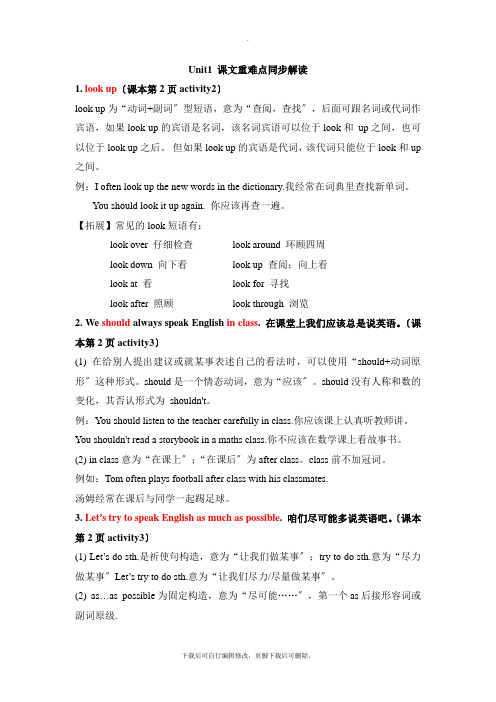
Unit1 课文重难点同步解读1. look up〔课本第2页activity2〕look up为“动词+副词〞型短语,意为“查阅,查找〞,后面可跟名词或代词作宾语,如果look up的宾语是名词,该名词宾语可以位于look和up之间,也可以位于look up之后。
但如果look up的宾语是代词,该代词只能位于look和up 之间。
例:I often look up the new words in the dictionary.我经常在词典里查找新单词。
You should look it up again. 你应该再查一遍。
【拓展】常见的look短语有:look over 仔细检查look around 环顾四周look down 向下看look up 查阅;向上看look at 看look for 寻找look after 照顾look through 浏览2. We should always speak English in class. 在课堂上我们应该总是说英语。
〔课本第2页activity3〕(1) 在给别人提出建议或就某事表述自己的看法时,可以使用“should+动词原形〞这种形式。
should是一个情态动词,意为“应该〞。
should没有人称和数的变化,其否认形式为shouldn't。
例:You should listen to the teacher carefully in class.你应该课上认真听教师讲。
You shouldn't read a storybook in a maths class.你不应该在数学课上看故事书。
(2) in class意为“在课上〞;“在课后〞为after class。
class前不加冠词。
例如:Tom often plays football after class with his classmates.汤姆经常在课后与同学一起踢足球。
人教新目标英语八年级上册Unit10重难点知识讲解+练习题(无答案)
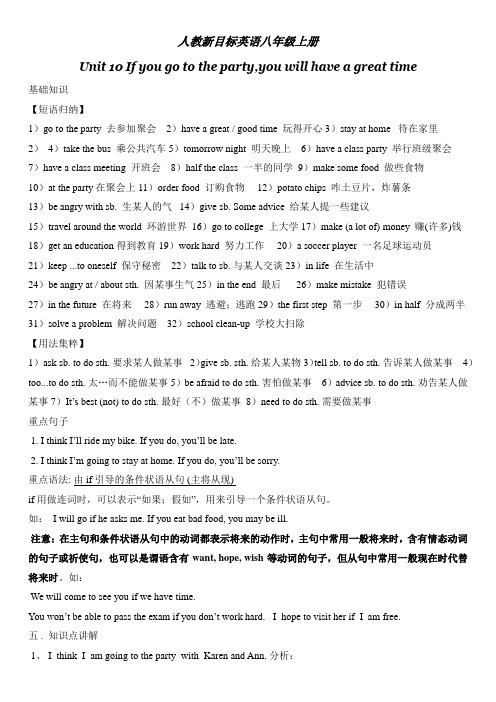
人教新目标英语八年级上册Unit 10 If you go to the party,you will have a great time基础知识【短语归纳】1)go to the party 去参加聚会 2)have a great / good time 玩得开心 3)stay at home 待在家里2) 4)take the bus 乘公共汽车 5)tomorrow night 明天晚上 6)have a class party 举行班级聚会7)have a class meeting 开班会 8)half the class 一半的同学 9)make some food 做些食物10)at the party 在聚会上 11)order food 订购食物 12)potato chips 咋土豆片,炸薯条13)be angry with sb. 生某人的气 14)give sb. Some advice 给某人提一些建议15)travel around the world 环游世界 16)go to college 上大学 17)make (a lot of) money 赚(许多)钱18)get an education 得到教育 19)work hard 努力工作 20)a soccer player 一名足球运动员21)keep ...to oneself 保守秘密 22)talk to sb. 与某人交谈 23)in life 在生活中24)be angry at / about sth. 因某事生气 25)in the end 最后 26)make mistake 犯错误27)in the future 在将来 28)run away 逃避;逃跑 29)the first step 第一步 30)in half 分成两半31)solve a problem 解决问题 32)school clean-up 学校大扫除【用法集粹】1)ask sb. to do sth. 要求某人做某事 2)give sb. sth. 给某人某物 3)tell sb. to do sth. 告诉某人做某事 4)too...to do sth. 太…而不能做某事 5)be afraid to do sth. 害怕做某事 6)advice sb. to do sth. 劝告某人做某事 7)It’s best (not) to do sth. 最好(不)做某事 8)need to do sth. 需要做某事重点句子1. I think I’ll ride my bike. If you do, you’ll be late.2. I think I’m going to stay at home. If you do, you’ll be sorry.重点语法: 由 if 引导的条件状语从句 (主将从现)if 用做连词时,可以表示“如果;假如”,用来引导一个条件状语从句。
人教版八年级英语上册unit1-10知识点总结

知识点8上unit1paragliding n.滑翔伞运动trader n.商人visit sb 看望某人visit sp 游览某地visitor 游客anyone=anybody 有人,任何人否定,疑问句代替someone/somebody肯句:任何人anyone 指人不指物后不接ofany one指人/物“任何一个”后可接of短语anyone做主,谓动单Anyone in my class knows any one of the singers and any one of their songs.adj.修饰不定代要后置anything special作定adj./to do 放在复合不定代词后复合不定代词作主语,谓语动词用单数some-肯定句any-否,疑。
疑中希望得到肯定回答用some-。
肯定句anyone任何人anything任何事接双宾buy sb. Sth.动词间宾直宾buy sth. to sb,直宾间宾直宾的代词只能用有to的形式give tell sell bring send pass show teachsend...to... 把...寄给... send for 派人去请You should send for a doctor.take a photo/photos of sb./sth. quite a few 相当多修饰cn. quite a little un.a little 修饰un./v./adj./adv.too many 修饰cn.复"太多" too much 修饰un. 修饰v.作状“太多”much too 修饰adj./adv."太" most of the time 大部分时间most of...做主谓看most of 后n./pronmost of us are...Most of the food goes bad.have a good time doing sth.How do you like =How do you feel about =What do you think ofgo sightseeing 去观光go surfing 去冲浪go skateboarding 去进行滑板运动go online 去上网(U2)Sometimes I go online for fun.有时我上网娱乐。
新人教版八年级英语上册1-10单元课文+翻译
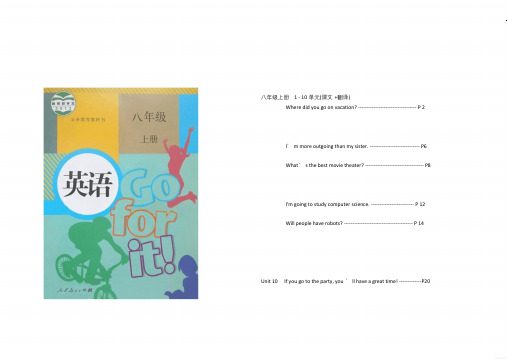
八年级上册 1 - 10 单元(课文+翻译)Where did you go on vacation? ---------------------------------- P 2I’m more outgoing than my sister. ----------------------------- P6What ’s the best movie theater? ---------------------------------- P8I'm going to study computer science. ------------------------- P 12Will people have robots? ---------------------------------------- P 14 Unit 10 If you go to the party, you ’ll have a great time! -------------P20Unit 1 Where did you go on vacation?你去哪儿度假了? Section A — 1b (P 1) Grace: I went to New York City.我去了纽约市。
Boy: Oh, really? Did you go with anyone? 啊,真的吗?你和别人去 的吧?Conversation 1(对话 1)Xiang Hua: Hey, Tina. Where did you go on vacation?嘿,蒂娜。
你 去哪儿度假了?Grace: Yes. I went with my mother.是的,我和我母亲一起去的。
Boy: Did you go to Central Park? 啊,真的吗?你去了中央公园 Tina: I went to the mountains with my family. 我和家人去爬山了。
人教版八年级上册英语单元教案(含教材分析)--Unit 1

Unit 1Where did you go on vacation?本单元教材以Where did you go on vacation?为中心话题,围绕着描述“过去发生的事情”展开,学习和运用一般过去时态的一般疑问句Did you go/see/buy...?和特殊疑问句Where/What/How...?询问过去的事件,让学生学会谈论和分享过去发生的事件。
本课教学内容与学生的实际生活密切相关,易于引发学生运用简单的英语进行交流。
在学习活动中,学生通过交换对过去发生的事情的描述及看法,促进学生之间和师生之间的情感交流,增进情谊。
Section A的主要学习内容是:复习一般过去时态和动词的规则与不规则变化,学习一般过去时态的一般疑问句:Did you...?及不定代词的用法。
Section B安排了许多听、说、读、写的任务活动,教师在教学中可以灵活运用这些活动,将其中的一些活动进行变化或整合,充分调动学生参与的积极性,提高学生的听说读写能力。
第一课时Section A(1a-2d)Teaching Goals【教学目标】Key words & phrases:anyone,anywhere,wonderful,few,most,quite a few,go on vacationKey sentences:1.Where did you go on vacation?I went to the mountains/New York City/summer camp/the beach.2.Did you...?Yes,I did./No,I didn't.Teaching Key Points【教学重点】The vocabulary:New York City,Central Park,few,most,quite a few,on vacationTarget language:Where did you/they/he/she go on vacation?I/They/He/She went to the mountains/New York City/summer camp/the beach. Did you...?Yes,I did./No,I didn't.Teaching Difficult Points【教学难点】Use the target language above to talk about past events.Teaching Aids【教学工具】An English textbook,a tape recorder,CAI or courseware.Teaching Steps【教学过程】★Step 1Leading inGreet the class and introduce what to learn in this period.Teacher:Welcome back to school!Did everyone have a good time during the summer vacation?Today we'll begin to learn the topic where you went on vacation.Teacher:Where did you go on vacation?Students:______.①I went to the mountains.②I visited museums.…★Step 2Pre-taskPage 1,1a & 1b.1.Look at the picture.2.Match each activity.3.Check the answers in 1b.4.Practice reading.Page 1,1c.1.Focus on the conversation in the box.2.Practice reading.3.Pairwork:Where did you go on vacation?I...4.Groupwork:Divide the class into groups of four or five. Make conversations.First S1 to S2:S1:Where did you go on vacation?S2:I...S1:Where did she/he go on vacation?S2:She/He...★Step 3While-taskPage 2,2a & 2b.1.Play the recording for the first time. Students complete the chart in 2a.2.Check the answers.(Point to one student who raises his or her hand.)3.Play the recording a second time and say:There are three conversations. The people talk about where they went on vacation. Listen to the recording and check(√)Yes,I did or No,I didn't for each question.4.Correct the answers.★Step 4Post-taskPage 2,2c & 2d.1.Focus on the conversation in 2c & 2d.2.Practice reading. Make students scan the conversations first.3.Teach and then make students role-play the conversation in pairs.4.Have a group of students present their conversation to the class.★Step 5Homework1.Practice the conversation on Page 2,2d.2.Do the exercises on Page 1 in students' book.Board Design板书设计Unit 1Where did you go on vacation?The first period Section A(1a-2d)1.Key vocabulary:anyone,anywhere,wonderful,quite a few,go on vacation 2.Target language:A:Where did Tina go on vacation?B:She went to the mountains.第二课时Section A(GF-3c)Teaching Goals【教学目标】Key words:something,nothing,everyone,myself,yourself,someone,seem,bored,diaryKey phrases:go out,have a good time,of course,keep a diaryKey sentences:1.Where did you go on vacation?I went to New York City.2.Did you go out with anyone?Did you buy anything special?3.How was the food?How was your vacation?Teaching Key Points【教学重点】The vocabulary:something,nothing,everyone,myself,yourself,someone,seem,bored,diary,go out,have a good time,of course,keep a diary,on vacation Target language:How was the food?Everything tasted really good!Did you go shopping?Of course!Did everyone have a good time?Oh,yes. Everything was excellent.Teaching Difficult Points【教学难点】e the target language above to talk about past events.2.The usage of someone,anyone,everyone,no one,something,anything,everything,nothing.Teaching Aids【教学工具】An English textbook,CAI or courseware.Teaching Steps【教学过程】★Step 1Leading in(T—teacher S—student)T:Where did you go last weekend?S:I went to the beach.T:Did you go there with anyone?S:Yes. I went to the beach with my brother.T:Did you have a good time there?S:...★Step 2Pre-taskPage 3,Grammar Focus.1.Review the grammar box. Work in pairs. One asks and the other answers.2.Practice reading the sentences in the chart.★Step 3While-taskPage 3,3a & 3b.1.Teach these new words:anyone,something,anything,everything,nothing,everyone,no one.2.Call students' attention to the conversation in 3a. Make students complete it individually.3.Choose a student to give his or her answers. Write the answers on the board.4.Correct the answers.5.Lead students to read this conversation.6.Have students work in pairs and role-play the conversation. As they talk,move around the classroom monitoring their work. Offer language or pronunciation support as needed.7.Make students complete the blanks in the e-mail message in 3b with the words in the box.8.Check the answers and then make students practice reading it.★Step 4Post-taskPage 3,3c.Complete the task in 3c.Ask your group questions about their last vacation. Then tell the class your results.★Step 5Homework1.Review the indefinite pronouns learned in this period.2.Do the exercises on Page 2 in students' book.Board Design板书设计Unit 1Where did you go on vacation?The second period Section A(GF-3c)1.The vocabulary:something,nothing,everyone,someone,myself,yourself,go out,of course2.Target language:①A:Where did you go on vacation?B:I went to New York City.②A:Did you buy anything special?B:Yes,I bought something for my father.3.Structure:something special4.Answers to 3a and 3b.第三课时Section B(1a-1e)Teaching Goals【教学目标】Key words:delicious,exciting,terrible,expensive,cheap,boringKey sentences:1.Where did Lisa go on vacation?2.Did she do anything special there?Did she buy anything for her best friend?Did Lisa like her vacation?3.How was/were...?Teaching Key Points【教学重点】The vocabulary:delicious,exciting,terrible,expensive,cheap,boringTarget language:Where did Lisa go on vacation?Did she do anything special there?Did she buy anything for her best friend?How was/were...?Teaching Difficult Points【教学难点】1.询问去过何地以及感受(评价)Where did you go?I went to the beaches. How was it?It was exciting.2.Use the target language to talk about your past events.Teaching Aids【教学工具】An English textbook,a tape recorder,CAI or courseware.Teaching Steps【教学过程】★Step 1Leading in1.Greetings.2.T:Where did you go on vacation?S:I went to summer camp.T:Did you do anything special there?S:Yes,I...T:Did you buy anything for your parents or friends?S:Yes,I bought...for.../No,I bought nothing.T:How was/were...?S:It was/They were...★Step 2Pre-taskPage 4,1a & 1b.1.Look at the six pictures.2.Match the words with the pictures.3.Students complete the task in 1b individually.4.Check the answers.★Step 3While-taskPage 4,1c & 1d.1.Make students scan the questions in 1c.2.Play the recording for the first time. And say:Listen to the tape. Lisa is talking about her vacation. Complete the four questions.3.Play the recording a second time. Students complete the task in 1d.4.Correct the answers.★Step 4Post-taskPage 4,1e.Ask 3 or 4 students to answer questions about Lisa's vacation. You can begin your questions with:Where did...?What did...?Did she...?How was...?How were...?★Step 5Homework1.Review these sentences:Where did...?Did...?How was/were...?2.Do the exercises on Page 3 in students' book.Board Design板书设计Unit 1Where did you go on vacation?The third period Section B(1a-1e)1.Words:delicious,exciting,terrible,expensive,cheap,boring2.Sentences:①Where did Lisa go on vacation?②Did she buy anything special?③Did she buy anything for her best friend?④Did Lisa like her vacation?3.Answers to Activity 1a:1—5f a c e b dAnswers to Activity 1b:wordsdeliciousexcitingcheapwordsterribleexpensiveboring第四课时Section B(2a-2e)Teaching Goals【教学目标】Key words:activity,decide,try,bird,bicycle,building,trader,wonder,difference,top,wait,umbrella,wet,below,enough,hungry,asKey phrases:feel like,because of,go to the beach,a lot of,a little,take the train,too many,what aboutKey sentences:1.I wonder what life was like here in the past.2.What a difference a day makes!3.We waited over an hour for the train because there were too many people.Teaching Key Points【教学重点】Learn Jane's diary entries about her vacation.1.The vocabulary:activity,decide,try,wonder,difference,wait,below,enough,hungry,as,feel like,because of2.Target language:I wonder what life was like here in the past. We waited over an hour for the train because there were too many people.Teaching Difficult Points【教学难点】1.because and because of2.What a difference a day makes!3.Learn to write a diary.Teaching Aids【教学工具】An English textbook,CAI or courseware.Teaching Steps【教学过程】★Step 1Leading in1.Greetings.2.Introduce what to learn in this period,especially the articles in 2b,Jane's diary entries. Teacher begins like this:Today we'll focus on two diary entries about Jane's vacation. Through the learning you'll know how to write a diary. Let's begin now.★Step 2Pre-taskPage 5,2a & 2b.1.Review and discuss the questions in 2a box with your partner.2.Project these new words on the screen or write them on the board and teach the new words. Ask students to repeat them. And make sure everyone knows the meanings.activity n.活动;decide v.决定;try v. & n.尝试,设法;wonder v.想知道;difference n.差异;top n.顶部;wait v. & n.等待;umbrella n.伞;below prep.& adv.在……下面;enough adj.充足的;hungry adj.饥饿的3.Make students scan the articles first. Ask students to put a mark in contents that are unfamiliar to them. Then the teacher lead students to learn these two articles sentence by sentence. Pay attention to these points:(1)decide v.决定;decide to do sth.决定做某事;(2)try v.尝试;try doing sth.尝试做某事;try to do sth.尽力做某事;(3)below prep. & adv.在……下面;(4)feel like 给……的感觉;(5)because and because of;(6)wonder v.想知道4.Practice reading.★Step 3While-taskPage 6,2c & 2d.1.Make students read Jane's diary entries again. Fill in the chart in 2c.2.Students complete the conversation in 2d using the information in Jane's dairy entries.3.Choose 3 or 4 students to give their answers.4.Correct the answers.5.Have students work in pairs. Student A will be Anna and student B will be Jane. Act the conversation out.★Step 4Post-taskPage 6,2e.1.Make students complete the blanks in 2e.2.Ask one student to write his or her answers on the board.3.Check the answers together with the class.4.Practice reading.★Step 5Homework1.Write a diary.2.Do the exercises on Page 4 in students' book.Board Design板书设计Unit 1Where did you go on vacation?The fourth period Section B(2a—2e)1.Key vocabulary:decide,try,wonder,difference,top,wait,below,enough,hungry,as,feel like,because of,too many2.Sentences:①I wonder what life was like here in the past.②And because of the bad weather,we couldn't see anything below.第五课时Section B(3a-Self Check)Teaching Goals【教学目标】Key words & phrases:duck,dislike,take photos,Tian'anmen Square,the Palace Museum,bring back,shopping center,have a fun time,school trip,come upKey sentences:1.How did you feel about the trip?2.It was so beautiful that we forgot about the last five hours!Teaching Key Points【教学重点】The vocabulary:dislike,take photos,Tian'anmen Square,the Palace MuseumTarget language:What did you like best?Did you dislike anything?How did you feel about the trip?Teaching Difficult Points【教学难点】Write a travel diary.Teaching Aids【教学工具】An English textbook,CAI or courseware.Teaching Steps【教学过程】★Step 1Leading in1.Greetings.2.T:Beijing is the capital of our country. It's famous for its long history and places of interest,such as Tian'anmen Square,the Palace Museum,the Summer Palace and so on. And Beijing duck is very delicious. Have you ever been to Beijing?Tell your travel to us.★Step 2Pre-taskPage 7,3a.1.Look at the three pictures.2.Use the words and phrases in the box to complete the blanks in the article.3.Check the answers.★Step 3While-taskPage 8,Self Check.Complete the tasks in Self Check.1.Have students complete the task of Part 1.Then Choose 2 or 3 students to give their answers. Check the answers.2.Induct students to complete the passage of Part 2.Check the answers.3.Practice reading.★Step 4Post-taskPage 7,3b & 3c.1.Make students answer the questions in 3b and take notes.2.Teach students how to write a travel diary.3.Students write a travel diary like Jane's on Page 5 using the notes in 3b.4.Choose 2 or 3 students' diaries. Make students read them out. Point out the weakness and induct the students to correct their diaries.★Step 5Homework1.Write a travel diary.2.Do the exercises on Page 5 in students' book.Board Design板书设计Unit 1Where did you go on vacation?The fifth period Section B(3a-Self Check)1.Key vocabulary:dislike,Tian'anmen Square,the Palace Museum,have a fun time,come up2.Sentences:①Did you dislike anything?②How did you feel about the trip?③My legs were so tired that I wanted to stop.。
牛津译林版八年级英语上册 Unit1-Unit2中考重难点回顾
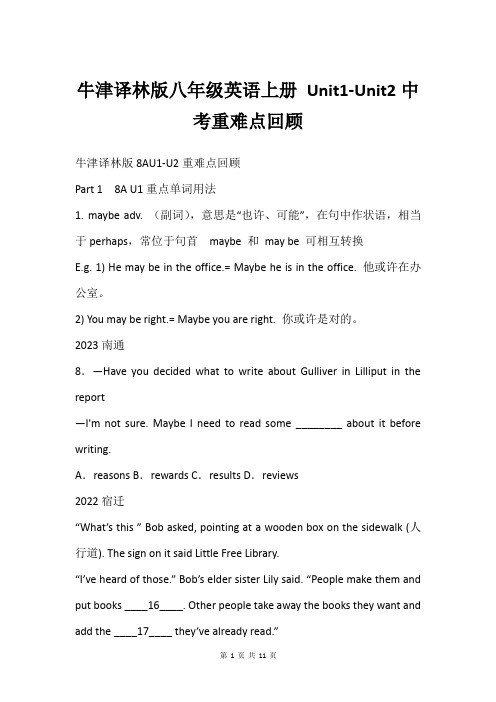
牛津译林版八年级英语上册Unit1-Unit2中考重难点回顾牛津译林版8AU1-U2重难点回顾Part 1 8A U1重点单词用法1. maybe adv. (副词),意思是“也许、可能”,在句中作状语,相当于perhaps,常位于句首maybe 和may be 可相互转换E.g. 1) He may be in the office.= Maybe he is in the office. 他或许在办公室。
2) You may be right.= Maybe you are right. 你或许是对的。
2023南通8.—Have you decided what to write about Gulliver in Lilliput in the report—I'm not sure. Maybe I need to read some ________ about it before writing.A.reasons B.rewards C.results D.reviews2022宿迁“What’s this ” Bob asked, pointing at a wooden box on the sidewalk (人行道). The sign on it said Little Free Library.“I’ve heard of those.” Bob’s elder sister Lily said. “People make them and put books ____16____. Other people take away the books they want and add the ____17____ they’ve already read.”“I want to make something like that,” said Bob. “For kids to exchange books.”“What if(要是……会怎么样) it doesn’t work ” Lily asked.“Why wouldn’t it ____18____ ” asked Bob. Lily shrugged(耸肩), “Maybe kids won’t notice it, or maybe they won’t want to ____19____ their books.”16.A.inside B.outside C.forward D.upward17.A.letters B.words C.books D.papers18.A.stay B.work C.keep D.change19.A.shake B.spell C.share D.sell知识趣读:may与be 的离婚记我们可以将may认为是以为男士,将be理解为一位女士,假如他们结合,那么只取may的含义,意思为“可能,也许”,但是一旦may 和be离婚,那么意思就要加上be的含义,意思为“可能是,可能在”了。
人教新目标英语八年级上册Unit-1重难点知识总结
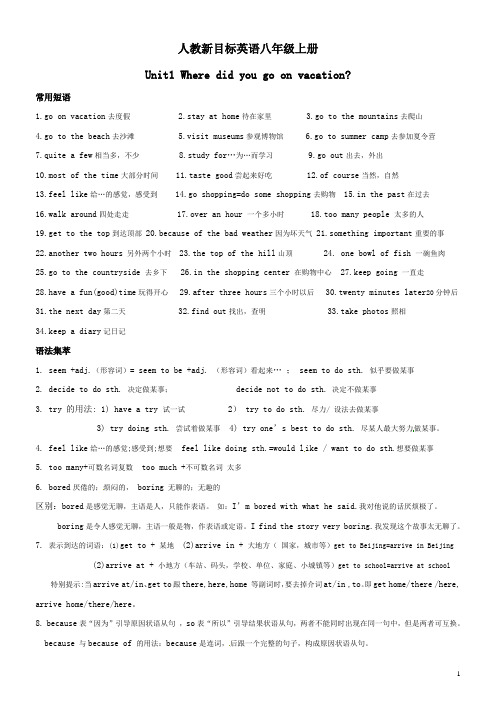
人教新目标英语八年级上册Unit1 Where did you go on vacation?常用短语1.go on vacation去度假2.stay at home待在家里3.go to the mountains去爬山4.go to the beach去沙滩5.visit museums参观博物馆6.go to summer camp去参加夏令营7.quite a few相当多,不少 8.study for…为…而学习 9.go out出去,外出10.most of the time大部分时间 11.taste good尝起来好吃 12.of course当然,自然13.feel like给…的感觉,感受到 14.go shopping=do some shopping去购物 15.in the past在过去16.walk around四处走走 17.over an hour 一个多小时 18.too many people 太多的人19.get to the top到达顶部20.because of the bad weather因为坏天气21.something important重要的事22.another two hours另外两个小时23.the top of the hill山顶 24. one bowl of fish 一碗鱼肉25.go to the countryside 去乡下 26.in the shopping center 在购物中心 27.keep going 一直走28.have a fun(good)time玩得开心29.after three hours三个小时以后30.twenty minutes later20分钟后31.the next day第二天 32.find out找出,查明 33.take photos照相34.keep a diary记日记语法集萃1. seem +adj.(形容词)= seem to be +adj. (形容词)看起来… ; seem to do sth. 似乎要做某事2. decide to do sth. 决定做某事;decide not to do sth.决定不做某事3. try 的用法: 1) have a try 试一试 2) try to do sth. 尽力/ 设法去做某事3) try doing sth. 尝试着做某事4) try one’s best to do sth. 尽某人最大努力做某事。
新人教版英语八年级上册--unit 1 课文重难点讲解
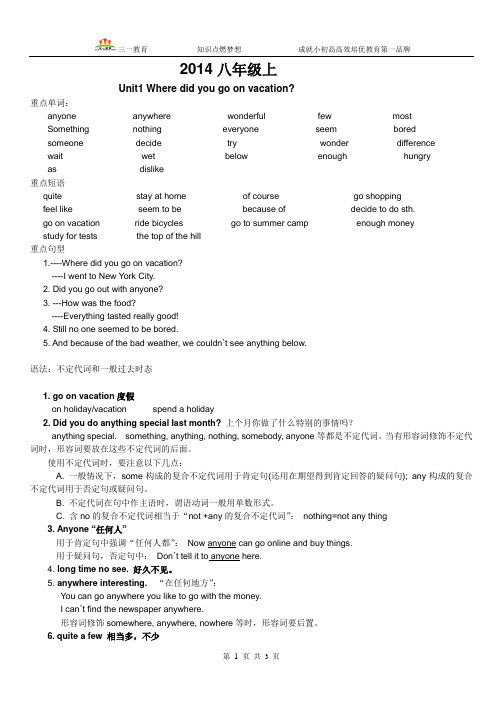
2014八年级上Unit1 Where did you go on vacation?重点单词:anyone anywhere wonderful few mostSomething nothing everyone seem boredsomeone decide try wonder differencewait wet below enough hungryas dislike重点短语quite stay at home of course go shoppingfeel like seem to be because of decide to do sth.go on vacation ride bicycles go to summer camp enough moneystudy for tests the top of the hill重点句型1.----Where did you go on vacation?----I went to New York City.2. Did you go out with anyone?3. ---How was the food?----Everything tasted really good!4. Still no one seemed to be bored.5. And because of the bad weather, we couldn’t see anything below.语法:不定代词和一般过去时态1. go on vacation度假on holiday/vacation spend a holiday2. Did you do anything special last month? 上个月你做了什么特别的事情吗?anything special. something, anything, nothing, somebody, anyone等都是不定代词。
人教版八年级英语上册Unit1-10重点短语汇总

人教版八年级英语上册Unit1-10重点短语汇总Unit1 Where did you go on vacation?【重点短语】1.go on vacation 去度假2. stay at home 待在家里3. go to the mountains 上山/进山4. go to the beach 到海边去5. visit museums参观博物馆6. go to the summer camp 去夏令营7. quite a few相当多8. study for为……学习,9. go out 出去10. most of the time 大部分时间/绝大多数时间11. taste good尝起来味道好12. have a good time玩的开心13. of course当然可以14. feel like 感觉像……/想要15. go shopping去购物16. in the past在过去17. walk around 绕……走18. too many太多(可数名词前面)19. because of因为20. one bowl of 一碗……21. find out 查出来/发现22. go on继续23. take photos照相24. something important重要的事情25. up and down 上上下下26. come up出来Unit2 How often do you exercise?【重点短语】1. help with housework帮助做家务活2. go shopping去购物3. on weekends在周末4. how often 多久一次5. hardly ever几乎不6. once a week每周一次7. twice a month每月二次8. go to the movies去看电影9. every day每天10. use the Internet 上网/用网11. be free有空12. have dance and piano lessons上舞蹈钢琴课13. swing dance摇摆舞14. play tennis打网球15. stay up late熬夜16. at least至少17. go to bed early早睡18. play sports 锻炼身体19. be good for 对…...有好处20. go camping去野营21. in one’s free time在某人的空闲时间22. not...at all根本不23. the most popular最流行的24. such as例如25. go to the dentist去看牙医26. more than 超过/多于27. Old habits die hard. 旧习惯难改28. hard=difficult困难的29. less than 少于/不到Unit3 I'm more outgoing than my sister. 【重点短语】1. more outgoing 更外向/更开朗2. as...as...与……一样3. the singing competition歌咏比赛4. the most important最重要的5. be talented in music在音乐方面有天赋6. the same as 与……相同7. care about 关心/留意/关注8. be different from 与…...不同9. be like a mirror像一面镜子10. as long as 只要;与…...一样长11. bring out 显示/显出12. get better grades取得更好的成绩13. reach for 伸手达到/达到14. touch one’s heart感动15. in fact事实上16. make friends交朋友17. be good at在某方面成绩好18. the other另一个19. be similar to 与…相似20. be good with 与…和睦相处Unit4 What's the best movie theater?【重点短语】1. so far到目前为止,迄今为止2. no problem 没什么,别客气3. have….in common 有相同特征(想法、兴趣等方面)相同4. be up to 由…...决定/是…...的职责5. all kinds of …各种各样的……6. play a role in doing sth./ sth. 发挥作用,有影响7. make up编造(故事、谎言等)8. for example=e.g.例如9. take …..seriously认真对待10. not everybody并不是每个人11. close to 离..….近12. more and more 越来越……Unit5 Do you want to a game show?【重点短语】1. find out 查出/发现2. be ready to do 准备做…3. dress up 打扮/化妆成4. take one's place代替某人5. do a good job 干的好/表演的出色6. think of 想到/思考7. game show游戏节目8. learn from 向…...学习9. talk show访谈节目10. soap opera 肥皂剧11. go on继续12. watch a movie看电影13. one of…其中之一14. try one’s best to =do one’s best to竭尽全力15. a pair of一双16. as famous as 一样闻名/出名17. look like 看起来像18. around the world世界各地19. have a discussion about 讨论…...20. one day 有一天/某一天21. such as例如22. a symbol of 一个象征/标志23. something enjoyable快乐的事情24.interesting information有趣的信息Unit6 I'm going to study computer science. 【重点短语】1. grow up 长大2. every day每天3. be sure about对某事确信4. make sure 确信/有把握5. send…to…把…...发送到...…/把...…寄…...6. be able to 能/能够7. the meaning of …...的意思/含义8. different kinds of不同种类的9. have …..in common 有…共同点10. at the beginning of 在…开始的时候11. write down 写下/记下12. have to do with 与….有关系13. take up 开始从事/着手处理/接受14. hardly ever几乎不15. too…to…太......而不能......Unit7 Will people have robots?【重点短语】1. on computers在电脑上2. on paper在纸上3. live to be 200 years old 活到200岁4. free time空闲时间5. in danger 在危险中6. on the earth在世界上7. play a part in sth 在某方面出力/做贡献8. space station太空站8. look for寻找9. computer programmer电脑程序师10. in the future在将来11. hundreds of成百上千的12. the same…as 与…...一样13. over and over again反复14. get bored无聊15. wake up 醒来/唤醒16. look like看起来像17.fall down 倒下/落下Unit8 How do you make a banana milk shake? 【重点短语】1. milk shake奶昔2. turn on打开,turn off 关上3. pour ….into…. 将…...倒入…...4. a cup of yogurt一杯酸奶5. a good idea 一个好主意6. on Saturday morning在星期六早上7. cut up 切碎8.put…into…将…... 放入...…9. one more thing 还有一件事10. a piece of 一片/一张/一块11. at this time 在此时12. a few几个13. fill…with…用…装满14. cover…with…用...…盖住15. one by one一个接一个16. a long time长时间17. cut…into pieces 将...…切成碎片18. add…to(into)…将...…加到......上(里)19. mix...together…将...…混合一在起20. mix up…将……混合21. serve …to…用...…招待…...22. half a cup半杯23. another ten minutes 另外十分钟24. peel the banana 剥一个香蕉Unit9 Can you come to my party?【重点短语】1. on Saturday afternoon在星期六下午2. have to必须3. prepare for 准备4. go to the doctor去看病5. have the flu 患流感6. help my parents给父母帮忙7. come to the party参加晚会8. meet my friend 见朋友9. go to the party参加晚会10. too much homework太多的家庭作业11. go to the movies去看电影12. another time下次,另外的时间,别的时间13. last fall去年秋天14. hang out 闲逛15. after school放学后16. on the weekend=on weekends 在周末17. study for a test备考18. visit grandparents拜访爷爷奶奶19. the day before yesterday前天20. the day after tomorrow后天21. have a piano lesson上钢琴课22. look after照看23. make an invitation制定邀请24. accept an invitation接受邀请turn down (refuse)an invitation拒绝邀请25. take a trip to Wuhan去武汉旅游26. at the end of this month在本月底27. look forward to + doing 期望/渴望28. the opening of…开幕/开业29.reply in writing写回信30.go shopping购物31.do homework做作业32. go to the concert参加音乐会33. not…until…直到......才......Unit10 If you go to the party, you’ll have a great time! 【重点短语】1.go to the party 参加晚会2. have a great /good time 玩得开心3.stay at home 待在家4. take the bus 乘公交车5.tomorrow night 明天晚上6.have a class party 举行班级聚会7.have a class meeting 开班会8.half the class 全班一半人9.make some food 做食物10.at the party 在聚会上11.order food 预订食物12.potato chips 薯条13.be angry with sb. 对某人生气14.give sb. some advice 给某人建议或劝告15.travel around the world 环游世界16. go to college 上大学17.make(a lot of)money 挣钱,赚钱18.get an education 接受教育19. work hard 努力工作;努力学习20. a soccer player 一个足球运动员21.keep…to oneself 保守秘密22.talk to sb. 与某人谈话23. in life 一生中24.in the end 在最后25. be angry at/about sth. 因某事而生气26. make mistakes 出错;犯错误27.in the future 在将来28.run away 逃跑29.the first step 第一步30.in half 分成两半31.solve a problem 解决问题32.school clean-up 学校大扫除。
人教版八年级英语上册1-10单元学霸笔记

⼈教版⼋年级英语上册1-10单元学霸笔记Unit1单元⼩结⼀、重点单词:anyone, wonderful, something, nothing, myself, bored, someone, diary, enjoyable, activity, decide, bird, bicycle, building, trader, wonder, difference, wait, umbrella, below, enough, hungry, duck, dislike⼆、词性变换:me (反⾝代词)enjoy (形容词)decide (名词)build (名词)difference (形容词)wet(反义词)hungry(名词)like (反义词)expensive(反义词)wonder (形容词)active (名词)三、重点短语:go on vacation, stay at home, go to the mountains, visit museums, go out, take photos, quite a few, of course, something special, have a good/fun time, feel like, walk up to, because of, decide to do, ride bicycles to, make notes, find out, go on, come up. study fora test, long time no see, most of the time, arrive in, along the way, go to the beach, upand down,四、重点语法结构:1.⼀般过去时态(标志词,句式)I was a middle school student two years ago.He went to the beach yesterday.2.不定代词⽤法--thing,指物,--one,指⼈。
人教版英语八年级上册unit-1--10知识点
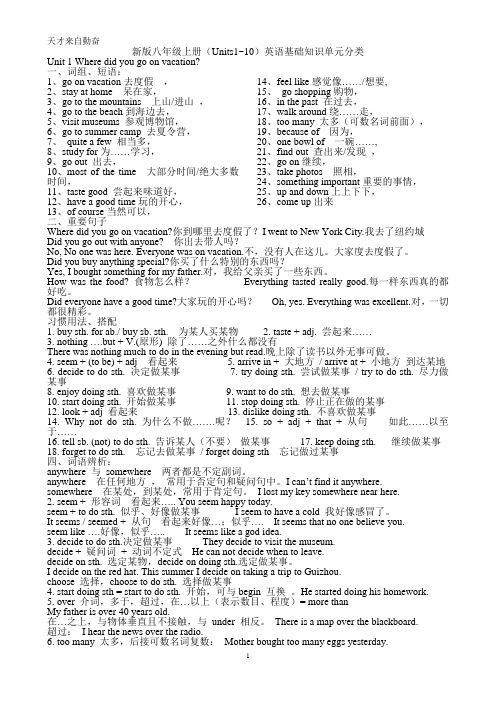
新版八年级上册(Units1~10)英语基础知识单元分类Unit 1 Where did you go on vacation?一、词组、短语:1、go on vacation去度假,2、stay at home 呆在家,3、go to the mountains 上山/进山,4、go to the beach到海边去,5、visit museums 参观博物馆,6、go to summer camp 去夏令营,7、quite a few 相当多,8、study for为……学习,9、go out 出去,10、most of the time 大部分时间/绝大多数时间,11、taste good 尝起来味道好,12、have a good time玩的开心,13、of course当然可以,14、feel like感觉像……/想要,15、go shopping购物,16、in the past 在过去,17、walk around绕……走,18、too many 太多(可数名词前面),19、because of 因为,20、one bowl of 一碗……,21、find out 查出来/发现,22、go on继续,23、take photos 照相,24、something important重要的事情,25、up and down上上下下,26、come up出来二、重要句子Where did you go on vacation?你到哪里去度假了?I went to New York City.我去了纽约城Did you go out with anyone? 你出去带人吗?No, No one was here. Everyone was on vacation.不,没有人在这儿。
大家度去度假了。
Did you buy anything special?你买了什么特别的东西吗?Yes, I bought something for my father.对,我给父亲买了一些东西。
人教版八年级英语上册第1单元预习重难点知识归纳

八上Unit1 知识点总结重点词汇hen(母鸡)pig(猪)diary(日记;记事簿)activity(活动)paragliding(滑翔伞运动)bird(鸟)bicycle(自行车;脚踏车)building(建筑物;房子)trader(商人)difference(差别;差异)top(顶部;表面)umbrella(伞;雨伞)hill(小山;山丘)duck(鸭)anyone(任何人)something(某事;某物)重点短语1.go on vacation去度假2.be on vacation 度假3..stay at home待在家里4.go to the mountains去爬山5.go to the beach去海滩6..visit museums 参观博物馆7.go to summer camp去参观夏令营8.quite a few相当多9.study for为……而学习10.go out出去11.most of the time大部分时间12.taste good尝起来很好吃13.have a good time玩得高兴14.of course当然15.feel like给……的感觉;感受到16..feel like doing sth 想要做某事17.go shopping去购物18..in the past在过去19.walk around四处走走nothing(没有什么)everyone(每人;人人;所有人)myself(我自己;我本人)yourself(你自己;您自己)someone(某人)seem(好像;似乎;看来)decide(决定;选定)wonder(想知道;琢磨)wonderful(精彩的;绝妙的)bored(厌倦的;烦闷的)wet(湿的;潮湿的;下雨的)hungry(饥饿的)anywhere(在任何地方)as(像……一样;如同)20..because of因为21.. one bowl of…一碗……22.. the next day第二天23..drink tea喝茶24. find out找出;查明25.. go on继续26.take photos照相27. something important重要的事28..up and down上上下下e up出来30.. something special 特殊的事情31..anyone interesting有意思的人32.go out with someone跟某人出去33..keep a diary 坚持写日记34..arrive in 到达大的地方35.arrive at (小地方 )36.get to 到达37.decide to do决定去做某事38.a lot of/lots of 许多39.enjoy doing 喜欢做某事40..too many people 太多的人41..try to do 试着做某事本单元语法不定代词有 all, each, both, either, neither, one, none, little, few, many, much, other, another, some, any, no, (a) few, (a) little, both, enough, every 等,以及由 some, any, no 和 every 构成的合成代词(即somebody, anyone, nothing 等)。
八年级上册英语Units1-10单元知识点归纳
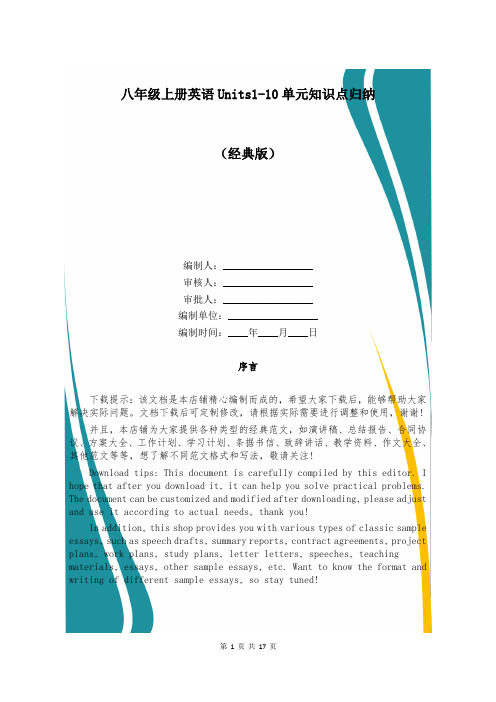
八年级上册英语Units1-10单元知识点归纳(经典版)编制人:__________________审核人:__________________审批人:__________________编制单位:__________________编制时间:____年____月____日序言下载提示:该文档是本店铺精心编制而成的,希望大家下载后,能够帮助大家解决实际问题。
文档下载后可定制修改,请根据实际需要进行调整和使用,谢谢!并且,本店铺为大家提供各种类型的经典范文,如演讲稿、总结报告、合同协议、方案大全、工作计划、学习计划、条据书信、致辞讲话、教学资料、作文大全、其他范文等等,想了解不同范文格式和写法,敬请关注!Download tips: This document is carefully compiled by this editor. I hope that after you download it, it can help you solve practical problems. The document can be customized and modified after downloading, please adjust and use it according to actual needs, thank you!In addition, this shop provides you with various types of classic sample essays, such as speech drafts, summary reports, contract agreements, project plans, work plans, study plans, letter letters, speeches, teaching materials, essays, other sample essays, etc. Want to know the format and writing of different sample essays, so stay tuned!八年级上册英语Units1-10单元知识点归纳英语短语是重点知识点内容,是写作以及阅读的重要素材,下面是本店铺给大家带来的八年级上册英语Units1-10单元知识点归纳,希望能够帮助到大家!八年级上册英语Units1-10单元知识点归纳Unit1 Where did you go on vacation?go on vacation去度假 stay at home待在家里 go to the mountains去爬山go to the beach去海滩 visit museums 参观博物馆 go to summer camp去参观夏令营quite a few相当多 study for为……而学习 go out出去 most of the time大部分时间taste good尝起来很好吃 have a good time玩得高兴 of course 当然 feel like给……的感觉;感受到go shopping去购物 in the past在过去 walk around四处走走 because of因为one bowl of…一碗…… the next day第二天 drink tea喝茶find out找出;查明 go on继续take photos照相 something important重要的事 up and down 上上下下 come up出来buy sth. for sb. / buy sb. sth.为某人买某物taste + adj. 尝起来…… look+adj. 看起来……nothing…but+动词原形除了……之外什么都没有seem+(to be)+ adj. 看起来……arrive in+大地点 / arrive at+小地点到达某地decide to do sth.决定去做某事try doing sth.尝试做某事 / try to do sth.尽力去做某事forget doing sth.忘记做过某事/ forget to do sth.忘记做某事enjoy doing sth.喜欢做某事 want to do sth.想去做某事start doing sth.开始做某事stop doing sth. 停止做某事 dislike doing sth. 不喜欢做某事 keep doing sth.继续做某事Why not do. sth.?为什么不做……呢?so+adj.+that+从句如此……以至于……tell sb. (not) to do sth. 告诉某人(不要)做某事Unit2 How often do you exercise?help with housework帮助做家务 on weekends在周末 how often多久一次 hardly ever几乎从不once a week每周一次 twice a month每月两次 every day每天 be free有空go to the movies去看电影 use the Internet用互联网 swing dance摇摆舞 play tennis打网球stay up late熬夜;睡得很晚 at least至少 have dance andpiano lessons上舞蹈课和钢琴课go to bed early早点睡觉 play sports进行体育活动 be good for对……有好处 go camping去野营not…at all一点儿也不…… in one’s free time在某人的业余时间 the most popular最受欢迎的such as比如;诸如 old habits die hard积习难改 go to the dentist去看牙医morn than多于;超过 less than少于help sb. with sth.帮助某人做某事 How about…? ......怎么样?/ ……好不好?want sb. to do sth.想让某人做某事 How many+可数名词复数+一般疑问句? ……有多少……?主语+find+that从句. ……发现…… spend time with sb.和某人一起度过时光It’s+ adj.+ to do sth. 做某事的……的。
八年级上册英语Unit 1 课文讲解
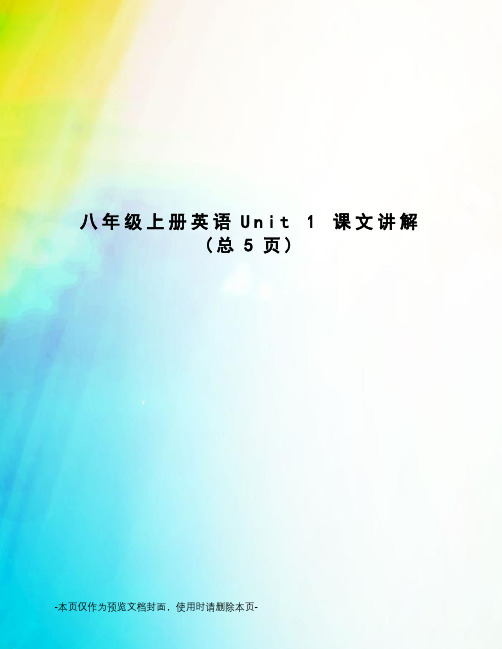
八年级上册英语U n i t1课文讲解(总5页)-本页仅作为预览文档封面,使用时请删除本页-Unit 1 课文讲解Section A 1a 用过去式表达下列词组:1.待在家里:_________at home 5. 去爬山:_______ to the __________________2.去纽约市:_______ to _______ ______ City 6. 去海滩:_______ to the _________3.看望我的叔叔:__________ my uncle 7.参观博物馆:_________ ___________4.去夏令营:________ to __________ __________1c. 例题:She went to the mountains.(对划线部分提问)_________ _________ she ________ (on vacation)2b 例句:①你和别人一起去的吗 Did you go ________ ________②你买了特别的东西了吗?Did you buy③你遇见有趣的人了吗?Did you meet _____________ ______________④你做有趣的事了吗 Did you do _____________ _______________⑤你为考试学习了吗(做准备了吗) Did you __________ _________ tests2d 重点例句:① 好久不见了。
________ ________ ____ _________.② 你去有趣的地方了吗Did you go ____________ _____________③你看见黄果树瀑布了吗?是的,太精彩了!_______ you _______Huangguoshu __________ Yes, I did. It _____ ____________.④我们在那里照了相当多的照片。
八年级上册英语知识点归纳-Unit1
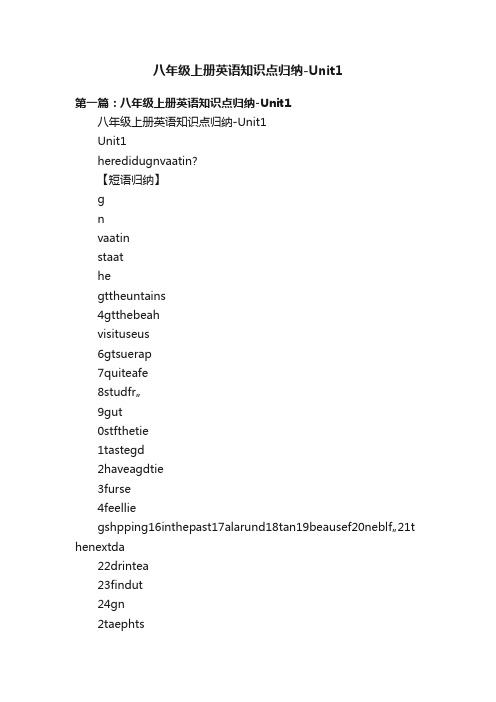
八年级上册英语知识点归纳-Unit1第一篇:八年级上册英语知识点归纳-Unit1八年级上册英语知识点归纳-Unit1Unit1heredidugnvaatin?【短语归纳】gnvaatinstaathegttheuntains4gtthebeahvisituseus6gtsuerap7quiteafe8studfr…9gut0stfthetie1tastegd2haveagdtie3furse4feelliegshpping16inthepast17alarund18tan19beausef20neblf…21t henextda22drintea23findut24gn2taephts26sethingiprtant27upanddn28eup【语法】buanthingspeial买特别的东西①busthfrsb=busbsth②anthing不定代词,意为“某事;某东西”,主要用于疑问句或否定句中。
表示“任何事;任何东西”时,主要用于肯定句。
③anthingspeial特别的东西,形容词修饰不定代词时应后置Hdidulieit?你觉得它怎么样?=hatduthinf…?Didugshpping?你们去购物了吗?g+ding表示去做某事,常用于表达从事某一体育活动或休闲活动gfishinggsiing…Thenlprbleasthatthereasnthinguhtdintheeveningbutread唯一的问题是晚上除了读书没什么事情可做。
Nthinguhtd没什么事可做nthing…but…除…之外什么也没有,but后可接名词或动词原形。
Stillnneseeedtbebred仍然没有人看起来无聊see可作不及物动词或连系动词,意为“好像,似乎,看来”see+形容词看起来。
useehapptdasee+tdsth似乎,好像做某事IseethavealdItsee/seeed+从句看起来好像。
外研版英语八年级上册Module 2 Unit1 课文重难点同步解读

Unit1 课文重难点同步讲解1. In fact, it only became important in the 1980s. 实际上,它在20世纪80年代才变得重要起来。
〔课本第10页〕短语in fact 事实上,实际上in fact 为固定短语,意为“事实上,实际上〞。
其中fact为名词,意为“事实;细节〞。
例:It’s a fact that he lost his bike.他的自行车丢了,这是事实。
In fact, Tom is a student, not a teacher.实际上,汤姆是学生,不是教师。
短语in the 1980s 在20 世纪80 年代“in + the + 年代+ -s〞是年代的表示方法,意为“在……世纪……年代〞,in the 1980s可以写成in the 1980’s,读作:in the nineteen eighties。
例:My grandpa was born in the 1950s.我外公出生在20世纪50年代。
【即学即练】I根据汉语意思完成句子(1). 事实上,这是一个悲哀的故事。
In fact, this is a sad story.(2). 他出生在20 世纪60 年代。
He was born in the 1960s/1960’s.II单项选择About of the students in Grade Nine this year were born in the .A. three five; 1996B. three fifths; 1990sC. third fifth; 1997D. third fifths; 1990s2. Some day it will become as busy as Hong Kong, I’m sure.我确信有一天它将和香港一样繁华。
〔课本第10页〕短语as...as...与……一样as...as...意为“与……一样……〞。
- 1、下载文档前请自行甄别文档内容的完整性,平台不提供额外的编辑、内容补充、找答案等附加服务。
- 2、"仅部分预览"的文档,不可在线预览部分如存在完整性等问题,可反馈申请退款(可完整预览的文档不适用该条件!)。
- 3、如文档侵犯您的权益,请联系客服反馈,我们会尽快为您处理(人工客服工作时间:9:00-18:30)。
2014八年级上Unit1 Where did you go on vacation?重点单词:anyone anywhere wonderful few mostSomething nothing everyone seem boredsomeone decide try wonder differencewait wet below enough hungryas dislike重点短语quite stay at home of course go shoppingfeel like seem to be because of decide to do sth.go on vacation ride bicycles go to summer camp enough moneystudy for tests the top of the hill重点句型1.----Where did you go on vacation?----I went to New York City.2. Did you go out with anyone?3. ---How was the food?----Everything tasted really good!4. Still no one seemed to be bored.5. And because of the bad weather, we couldn’t see anything below.语法:不定代词和一般过去时态1. go on vacation度假on holiday/vacation spend a holiday2. Did you do anything special last month? 上个月你做了什么特别的事情吗?anything special. something, anything, nothing, somebody, anyone等都是不定代词。
当有形容词修饰不定代词时,形容词要放在这些不定代词的后面。
使用不定代词时,要注意以下几点:A. 一般情况下,some构成的复合不定代词用于肯定句(还用在期望得到肯定回答的疑问句); any构成的复合不定代词用于否定句或疑问句。
B. 不定代词在句中作主语时,谓语动词一般用单数形式。
C. 含no的复合不定代词相当于“not +any的复合不定代词”:nothing=not any thing3. Anyone “任何人”用于肯定句中强调“任何人都”:Now anyone can go online and buy things.用于疑问句,否定句中:Don’t tell it to anyone here.4. long time no see. 好久不见。
5. anywhere interesting.“在任何地方”:You can go anywhere you like to go with the money.I can’t find the newspaper anywhere.形容词修饰somewhere, anywhere, nowhere等时,形容词要后置。
6. quite a few 相当多,不少quite为副词,修饰a few.a few, few, a little, little:修饰可数名词: a few----表肯定。
few---表否定。
修饰不可数名词:a little---表肯定。
little---表否定。
7. most of the time大多数时间Most的单复数概念取决于of后面的名词,谓语动词根据of后面的名词来决定。
Most of the students in our school are from the country.Most of the moon cake is bad.8. relax 动词:放松;松弛The children should relax at least.9. Still no one seemed to be bored.A. I got very bored because of the boring movie.Relax--relaxed放松的;lose--lost丢失的;please--pleased高兴的;close--closed关着的;surprise--surprised惊奇的;excite--excited兴奋的;worry--worried担忧的;interest--interested感兴趣的。
B. Seem连系动词或不及物动词,用法如下:----主语+seem+(to be+)表语:Tom seems (to be) a very clever boy.----主语+seem+不定式,seem与不定式一起构成谓语:Mr. Green doesn’t seem/ seems not to like the idea.----“It seems+that从句”,其中it是形式主语,that引导主语从句:It seems that no one knows what has happened in the park.It seems to me that Mr. Brown will not come again.----“There+seem (to be) +名词”. Seem的单复数形式根据后面主语而定。
There doesn’t seem to be much hope of our beating that team.10. 不定代词。
不指明代替任何特定名词或形容词的代词叫不定代词。
A.B. 普通不定代词的用法:---some; any的用法:some用于肯定句(希望得到对方的肯定回答时的疑问句也用SOME);any用于否定句和疑问句。
---many与much:many修饰可数名词复数,much修饰不可数名词。
两个都可与表示程度的副词so, too, as, how连用。
C.---当句子的主语是指人的复合不定代词,如everybody, nobody,anyone等时,反意疑问句的主语常用代词they: Everybody is here, aren’t they?---主句的主语是指物的复合不定代词,如everything, anything, something, nothing等时,反意疑问句的主语常用it:Everything is ready, isn’t it?---当形容词或else修饰复合不定代词时,形容词或else要后置:Xiaoming, he has something important to tell you.Can you find anyone else?---Everyone 的意思等同于everybody,只能指人;every one可指人也可指物,还可以和of短语连用:I’d like everyone to be happy.I’ve kept every one of her letters.11. decide 动词:决定。
名词:decision.decide to do sth. 决定做某事。
decide not to do sth.decide = make up one’s minddecide接从句:He decide to buy a new car.=He decided that he would buy a new car.12. try的用法:动词:try to do sth. 尽力做某事try not to do sth. :He is trying to draw a horse.try doing sth. 试着做某事。
: You should try taking more exercise.try one’s best 尽某人最大努力。
I’ll try my best to help him.try on 试穿。
Would you like to try this dress on?名词:have a try.13. feel like---感觉像是:My legs feel like cotton wool.---想做...: I don’t feel like cooking. Let’s eat out.14. wonder---接宾语从句:I wonder where you are tonight.---奇迹,奇观:The Great Wall is a man-made wonder.15. What a difference a day makes!Difference 名词,different形容词,be different from:There are many differences between the twins.American English is significantly different from British English.16. And because of the bad weather, we couldn’t see anything below.because of “因为...,由于....”;17. enough的用法:---enough形容词,常与for或不定式连用,修饰复数名词或不可数名词:Five men will be quite enough.He has enough money to buy a car.---enough与某些具有形容词意味的名词连用时,enough必须后置。
且该名词通常不用冠词修饰。
I was fool (=foolish) enough to accept his offer.---enough 作副词:十分地;充分地。
置于被修饰的形容词或副词后,后可接不定式或for,He didn’t practice enough.She isn’t good enough for (=to pass) the exam.Unit2 How often do you exercise?重点单词:Housework hardly once twice Internetfull maybe least junk healthresult percent online although mindsuch die writer dentist almostnone less point重点短语how often fifteen percent hardly at least swing dancejunk food how many such as less than fifteen percentgo online be good for swing dance more than junk foodWatch TV a lot of good habits such as go to the dentistless than重点句型1. ---What do you usually do on the weekends?----I always exercise.2. They often help with housework.3. ---How often does he watch TV?---He hardly ever watches TV.4. Forty-five percent exercise four to six time a week.5. She says it’s good for my health.6. Although many students like to watch sports, game shows are the most popular.语法:频率副词的用法。
